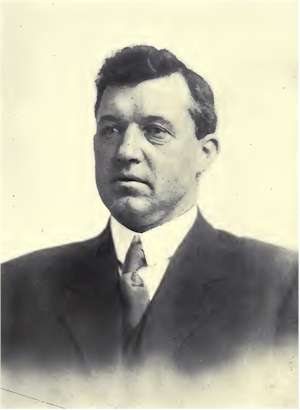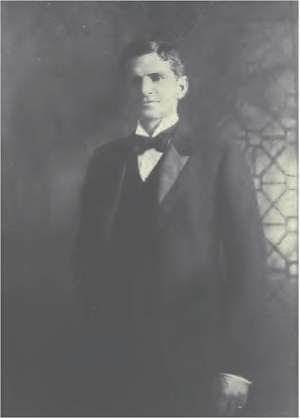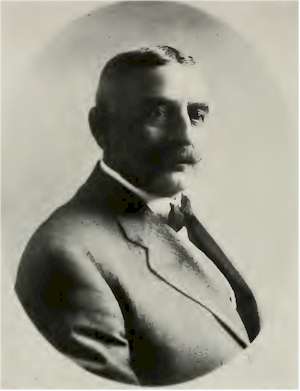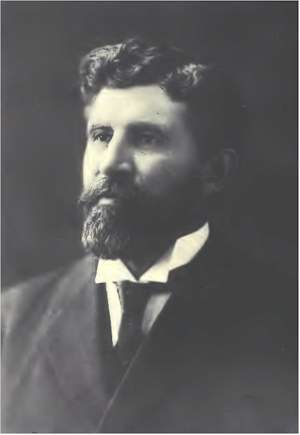Utah Biographies ~ Moran to Moyle

Moran, Patrick J.
Running along the side of the Wasatch Range, which guards the
eastern side of the Salt Lake valley, and away above what is
known as the bench, on the mountain side, is a conduit. One can
walk through the conduit for a distance of eight miles. It
carries a part of the water supply for Salt Lake City and is
known as the Big Cottonwood Conduit. It is the greatest piece of
work of its kind on the western slope of the Rocky Mountains,
and among the largest in the country. It will always stand as a
monument to its builder, Patrick J. Moran.
Born in Yorkshire, England, January 23rd, 1863, left fatherless
at the age of seven years, engaged in active work at ten years
of age, Patrick J. Moran has carved his own way through the
world and, is in every sense of the word a self-made man. His
parents settled in Yorkshire in 1853, his father being Laurence
Moran of County Mayo, and his mother, Bridget Durkin, was from
County Sligo, Ireland. His father died in 1870, and his mother
died in 1902.
Mr. Moran's early life was spent in hard work, and he has been
actively at work ever since he was ten years old. His education
was acquired in the workshop and by hard study of later years.
When fourteen years old, Mr. Moran came to America, landing at
Baltimore in April. After four months' residence in that city he
went to Cincinnati, where he was apprenticed to a steam-fitter,
and in that city he learned this trade. After mastering his
trade he went to Chicago, where he worked as journeyman fitter
until 1887, when he removed to Omaha, remaining there and
working at his trade until September, 1887, when he came to Salt
Lake City, since which time he has made this city his home.
After two years in Salt Lake City, working at steam-fitting, he
began business for himself as contractor in steam-heating and
ventilating work. While in this business he put in most of the
heating plants in the public school buildings of Salt Lake, also
for the new State University in Salt Lake, the Agricultural
College at Logan, most of the prominent business blocks and
residences in Salt Lake City, and churches arid schools
throughout the State.
In 1900, when the first contract was let by the city for the
installation of water-works construction, Mr. Moran was awarded
the contract. Three years later he entered the asphalt paving
business. Almost all of the asphalt paving on Salt Lake, streets
has been put there by Mr. Moran, and of his work it can be said
that it is of the best possible kind. Nothing was ever slighted,
and he has earned the reputation of doing the best work of; any
contractor in any city in the country. He has a great fortune
invested in his plant, which includes everything modern for
expedition and thorough work, and he employs an army of workmen.
In addition to the paving and the construction of the Big
Cottonwood aqueduct, he has other contract work in the way of
constructing concrete masonry for the plant of the American
Smelting and Refining Company at Garfield, Utah, the largest
plant of its kind in the United States. He has also the contract
to build the Weber Canyon wooden-stave pipe power line, an
immense piece of work for the Utah Light and Railway Company. .
Mr. Moran was elected in 1891 to the Territorial Council by the
Liberal Party, and in February, 1892, was elected on the same
ticket as a member of the city council for a term of two years
from the fourth precinct of Salt Lake City/ These are the only
political offices he has ever held. He is a member of the Alta
and Commercial clubs, and also of the Elks.
Mr. Moran was married in 1891, to Miss Dollie Shoebridge, of
Salt Lake. Six children were born them, four boys and two girls,
all living with his family. Mr. Moran lives in a handsome home
at 1106 East South Temple Street.

Morgan, George W.
One of the men who have risen through their own efforts to
positions of prominence in the business and mining world of the
West is George W. Morgan, proprietor of the Vienna Cafe, one of
the best known restaurants between Denver and the Coast, and the
president of the Imlay Mining Company, the headquarters of which
are in Salt Lake.
Mr. Morgan was born in St. Lawrence County, New York, July 7,
1863, but, while still a boy, his parents removed to Cincinnati,
Ohio, where the young man received his earlier education. His
father was Frederick H. Morgan, a well-known manufacturer and
carriage builder of Cincinnati, and for a time the young man was
connected with this line of business. On August 16, 1892, he was
married to Miss Kate Fanning, of Butte, Montana, and in
December, 1898, he removed to Salt Lake City, and has since made
it his home.
One of Mr. Morgan's earlier business ventures in Utah was the
Vienna Cafe, at that time a little-known eating house, on Main
Street, Salt Lake's principal business thoroughfare. By sheer
force of personality and strict attention to business, Mr.
Morgan succeeded in building up a large and profitable business
before he began to turn his attention to other fields of
industry. The mining business early attracted him, and, in
addition to his large interest in the Imlay Mining Company, he
is also vice-president of the West Quincy Mining Company, with
properties in Park City, and is a director and member of the
Executive Board of the Clayton-Daynes Music Company, a director
of the Capital Electric Supply Company, vice-president of the
Sunnybrook Coal Company, and vice-president and managing
director of the Reno Wholesale Grocer Company.
The Vienna Cafe of recent years has become the headquarters for
mining and professional men of the inter-mountain region, and
here its genial proprietor is to be seen at his best. While Mr.
Morgan's rise in a business way has been rapid and substantial,
in the social life of the city he is almost equally well known.
He is a member of the Alta Club, the Elks, and the Commercial
Club of Salt Lake, and is a thirty-second degree Mason, a Knight
Templar and a Shriner. He occupies a handsome residence at 311
East Fifth South Street, where Mr. and Mrs. Morgan have achieved
a more than local reputation for lavish entertainment and
open-handed hospitality.
Notwithstanding the wide and varied nature of his interests, Mr.
Morgan has been enabled to give close attention to the affairs
of each of the industries with which he is connected. Under his
management the Imlay Mining Company has made rapid strides along
the lines of success and the Reno Wholesale Grocer Company,
through its conservative management and up-to-date methods, has
succeeded in building up a splendid volume of business. The
Sunnybrook Coal Company is regarded as one of the promising
enterprises of the State, while his other interests enjoy an
equal measure of prosperity. In the eleven years which he has
been in Salt Lake, Mr. Morgan has made a host of friends, all of
whom are enthusiastic in their admiration of what he has so far
accomplished.

Moritz, Jacob
Jacob Moritz, who is the energetic and
progressive vice-president, treasurer and general manager of the
Salt Lake City Brewing Company, is a native of Germany, born at
Ingenheim, Rhempfalz, February 22, 1849. His father, Isaac
Moritz, was a merchant and hotel proprietor in the old country.
Jacob attended the schools of his native city, and subsequently
graduated from a business college in Mannheim, Germany, and
immediately entered upon a business career. September 14, 1866,
he emigrated to America and soon secured employment with the F.
M. Schaefer Brewing Company, one of the best in New York, where
he remained for two years, acquiring much knowledge of the
business in that short time. His next place was with the
Anheuser-Busch Brewing Company in St. Louis, where he remained
for a short time and then determined to try the mining business.
He went to Helena, Montana, and engaged in that work until 1871,
when he came to Salt Lake City. About that time he started the
Montana Brewery, under the firm name of Moritz & Richter, near
Warm Springs, and conducted a successful business there for four
years, when the new brewery was built within the city limits.
Success still followed him, until today the plant of the Salt
Lake City Brewing Company is without doubt the largest in the
inter-mountain country, having a capacity of four hundred
barrels a day, and bottling one thousand three hundred dozen per
day. The brands are American Beauty, Pilsener, and Export, and
also an excellent Porter Triple.
In 1875 Mr. Moritz purchased the interest of Mr. Richter, and
also the interest of Mr. Jonnasson in the Tenth Ward Brewery, of
which Mr. Moritz was brew-master and manager. He then formed a
partnership with Aaron Keysor, which ran until 1881, at which
time the Keysor interest was purchased by Matt Cullen and the
firm was changed to Moritz & Cullen, and continued as such until
1883, when the company was incorporated as the Salt Lake City
Brewing Company, which it is called today. The capacity is about
125,000 barrels per annum, shipping to Idaho, Wyoming, Montana,
Nevada, Colorado, and California. They employ about one hundred
men, and the brewery is equipped with all modern machinery in
the plant, and everything known in the modern science of brewing
beer is employed. The plant is a model one in every respect, and
the output as pure and good as capital and brains can make it.
The brewery in point of excellence is second to none in the
country, and has a complete electrical equipment.
Mr. Moritz served a term in the State legislature, and was a
member of the Constitutional Convention, and in many ways has
evidenced a keen interest in the welfare of his party and the
City of Salt Lake.
In May, 1889, Mr. Moritz was married to Lahela Louisson, who was
born in Honolulu, of Prussian ancestry, and they reside in Salt
Lake City.
Mr. Moritz is a man of energy, unassuming in manner, and a keen
observer of human nature. Besides his connection with the
brewing company, he is interested in the Burning Moscow Mine and
Milling Company, a director in the Little Chief Mining Company,
and is a large holder of real estate in Salt Lake City.

Morrison, Lorin N.
One of the best known and prominent
mining men of Utah, who has won prominence through his wonderful
capabilities and efficiency, is Lorin N. Morrison. That all of
his mining interests are in the State of Utah shows what faith
he has in the future of this wonderful industry, in this State.
Mr. Morrison's career has been one of activity, and he, like
many others, has learned the lesson that the secret of success
lies in hard and consistent plugging, and not in lying down when
beset with adversities.
Mr. Morrison was born on the 3rd of June, 1855, in the town of
Black Brook, Clinton County, New York. He is the son of Bradley
Morrison and Marv Ramsdell Morrison. His father was a lumber and
iron contractor, and the young man, when yet a boy, became
interested in the lumber business. It was the experience that he
received in his extreme youth that stood him in hand when he
went out into the world to earn his own fortune. He was
educated, or received his early training, in the schools of
Dannemora, Clinton County, and Chateaugay, Franklin County, New
York. School not appealing to the boy, at the age of fourteen he
left home and went to Menominee and engaged in the lumber
business, and then in the charcoal business. From the above
place he went to Marquette and was engaged in the same lines. He
worked for many years in this country and became very prominent
and respected by all of those with whom he came in contact.
He always had a desire for the West, and as soon as he deemed it
wise he started for this country. He first located in Hilliard,
"Wyoming, where, in company with his brothers, he engaged in the
charcoal trade. At this time they found that business very
profitable and were soon looked upon as the charcoal men of that
country. For a long time he with his brothers supplied the
Flagstaff mines and smelters with over one hundred thousand
bushels of charcoal a month. This business proved to be a very
lucrative one, and they were content to stay there for some
time. Mr. Morrison, however, having had a desire to engage in
the mining industry, came to Utah on leaving Hilliard, and,
arriving here, became engaged in the industry at Frisco, Utah.
He was very successful from the outset, and, after putting a
great deal of time in the promotion of this property, he soon
began to interest himself in other properties throughout the
State. He promoted, in conjunction with others, the Comet,
Blackbird, Yankee Con, Gold Development, Indian Queen, Con and
King David Mining Companies. All 'of these companies are too
well known to speak of them here, other than to say that Mr.
Morrison has been uniformly successful in all of these ventures
and exemplified the foresightedness and the aggressiveness for
which he had gained such a reputation in whatever country he had
been; engaged in business. To-day this gentleman is looked upon
in the State! of Utah, where all of the mines in which he is
interested are located, as one of the best men in the game, and
his friends say that he is deserving of all the credit that is
given him.
His domestic life is a most happy and congenial one. He was
married to Miss Kate Kennedy on the 7th of April, 1881. The
union has been blessed by two children, Lorin E. and Laura
Morrison. A man of domestic tastes, his whole life is wrapped up
in his home, and his beautiful residence at 437 South Fourth
East is frequently the scene of delightful house parties. He is
not identified or affiliated with any clubs or societies, and he
has never craved political prestige. He is an indefatigable
worker, and when his work is done, he seeks the quietude of his
own fireside.

Moyle, James H.
James H. Moyle, one of Utah's most
representative attorneys, is a native of Salt Lake City, having
been born there September 17, 1858. His father, James Moyle, was
a successful builder and contractor, and his mother was
Elizabeth Wood Moyle. J. H. Moyle was educated in the district
schools of Salt Lake City, and later took a course at the
University of Utah, graduating in 1881. He subsequently took the
course at the University of Michigan Law School, from which he
graduated in 1885, and was a student for three years also at the
University of Michigan in its School of Political Science.
Mr. Moyle was admitted to the bar of Utah and of Michigan in
1885, and later to the Supreme Court of the United States. He
was Assistant City Attorney and Deputy County Attorney for one
year, and was elected County Attorney in 1886, and re-elected in
1888. The same year he was elected a member of the State
legislature. He was chairman of the committee in 1889 which
visited the principal Reform Schools of the United States, and
upon whose report our Territorial Reform School was established.
He was chairman of the Democratic State Committee in the
campaigns of 1898 and 1899, and his party was victorious in
both. During the last day of the legislature in 1899, Mr. Moyle
was the caucus nominee of the Democratic Party for United States
Senator; but no Senator was elected because of so many members
being held by obligations to A. W. McCune, from which he would
not release them. Hence the deadlock.
Mr. Moyle was the choice of the Democrats as their candidate for
governor in 1900 and 1904, and in the latter campaign led his
ticket in number of votes received by him. He also has taken a
keen interest in livestock, its conventions and organizations,
and was for many years a director of the Utah Fair Association.
He was also for many years a trustee of the Reform School, and
for two years was president of the Board of Trustees of that
institution. While Mr. Moyle is active in business, farming,
livestock, and mining, he has been more attentive to his large
legal practice. The law firm was originally Richards & Moyle;
later on, Moyle, Zane & Costigan and at the present time, Moyle
& Van Cott, and their clientage and law business is one of the
largest in the State.
Mr. Moyle is a director in the Consolidated Wagon and Machine
Company, the Deseret Live Stock Company, the Utah Commercial and
Savings Bank, the Silver Brothers' Iron Works Company, the
Inter-Mountain Packing Company, the Utah Independent Telephone
Company, the Utah Consolidated Plaster Company, the Blackfoot
Stock Company, and many other important enterprises, especially
mining companies, too numerous to mention.
Mr. Moyle was married to Alice E. Dinwoodey, November 17, 1887,
and they are the parents of eight children, of whom six are
living, namely: Henry D., Alice E., Walter G., Gilbert D., James
D., and Sarah Virginia Moyle.
Mr. Moyle is a member of the Commercial Club and president of
the Utah Democratic Club. He resides at 405 East First South
Street, Salt Lake City.

Index

Source: Sketches of the Inter-Mountain
States, Utah, Idaho and Nevada, Published by The Salt Lake
Tribune, Salt Lake City, Utah, 1909
|

